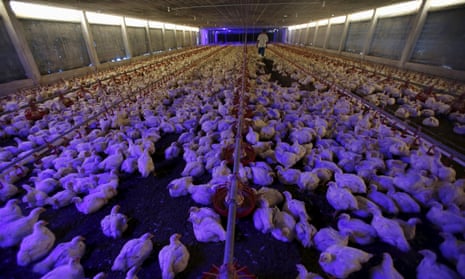The meat industry has reason to be worried. The last line of antibiotic defence against some serious infections is under threat - and blame is being directed at the livestock sector, accused of overuse or misuse of drugs. In the US, more antibiotics are sold for food producing animals than for people.
As one of the world’s biggest and most profitable meat brands US-based Tyson Foods has promised to end the use of human antibiotics. But how committed is it to cleaning up its act? Does it believe there is a problem, or is it all about good PR?
In an interview with the Guardian, Tyson Foods CEO Donnie Smith, gave his thoughts on the topic.
We have to keep meat affordable
“Obviously there is a global health concern about antibiotic resistance but we also have to balance that with animal welfare. If you have a flock of birds that have contracted some kind of disease, it is inhumane not to treat them. What we think we’ve done is maybe found the most responsible balance between three priorities: animal welfare, global concern about antibiotic resistance and being able to keep food affordable.”
I don’t see a problem with antibiotic use
“We’ve studied a lot of science about whether or not there is a direct connection [between the use of antibiotics in livestock and spread of antibiotic resistant infections in humans]. I’m not sure any of the science I’ve reviewed points to a straight connection [The US Department for Health confirms the link], but consumers are concerned so what we’re trying to do is address the consumer concern about antibiotic resistance. I don’t see there is a problem ... I think we are better off if we have a production system that has the capability of using less of anything.”
Our farms are not dependent on antibiotics
“I don’t think we have a system [for raising broiler chickens] that is dependent on antibiotic use for its sustainability. We have found that as we have reduced the level of antibiotics we use, whether it’s human use or vet-only, our cost has actually gone down. A lot of the ways we’ve been able to accomplish this is by working with our farmers on better husbandry practices.”
If mum wants an antibiotic-free chicken nugget we must provide it
“Health and wellness used to be ‘I’m gonna go on a diet, I’m gonna lose weight and I’m gonna exercise more’. Today, it means as much about how my food is produced, was it sustainably sourced, was it raised responsibly etc... There’s a larger number of consumers today that believe how their food is produced influences their health. I don’t know how it does ... If this millennial mum wants a no-antibiotic ever, or gluten-free nugget we better supply that.”










Comments (…)
Sign in or create your Guardian account to join the discussion